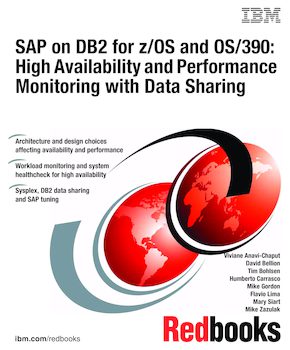SAP on DB2 for z/OS and OS/390: High Availability and Performance Monitoring with Data Sharing
An IBM Redbooks publication
Note: This is publication is now archived. For reference only.

Published on 21 December 2003, updated 01 March 2004
ISBN-10: 0738453072
ISBN-13: 9780738453071
IBM Form #: SG24-6950-00
Authors: Viviane Anavi-Chaput, David Bellion, Tim Bohlsen, Humberto Carrasco, Mike Gordon, Flavio Lima, Mary Siart and Mike Zazulak
This IBM Redbooks publication addresses the challenges posed by monitoring high availability, scalability, and performance in an SAP sysplex data sharing environment. It introduces the motivations for utilizing a design based on DB2 data sharing. It includes the principal SAP-DB2 data sharing architecture options and trade-offs used in the industry today and issues that play a role in both high availability and scalability, such as failover design, database connectivity design, workload splitting and load balancing, MCOD, and coupling facility design.
The book discusses single point of failure, important failover scenarios and outage avoidance, automation of high availability constructs, and backup and recovery considerations in data sharing environments. Performance issues are detailed in the order you would approach them at planning and implementation time. First, it discusses tuning the sysplex, which is the base for a well-performing DB2 data sharing system, then tuning the DB2 data sharing system, which is the base for a well-performing SAP system, and finally, tuning the SAP system.
The book focuses on initial planning for performance and monitoring it afterward, and explains the key points to look for to health-check your system and maintain high performance.
Part 1. Architecture and design choices affecting availability and performance
Chapter 1. Introduction to SAP high availability and performance architecture
Chapter 2. Architecture options and trade-offs
Chapter 3. Workload splitting and logon load balancing
Chapter 4. MCOD with data sharing
Chapter 5. Coupling facility design considerations
Part 2. High availability considerations
Chapter 6. Single point of failure avoidance
Chapter 7. SAP Sysplex failover
Chapter 8. Automation architectures for availability in data sharing
Chapter 9. Backup and recovery architecture in data sharing
Part 3. Performance considerations
Chapter 10. Sysplex performance
Chapter 11. Data sharing performance
Chapter 12. SAP performance
Appendix A. Checking SAP data sharing setup
Appendix B. Systems managed duplexing